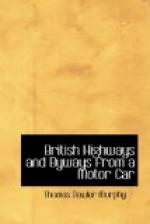From Huntingdon we returned to Cambridge, having completed a circular tour of about sixty miles. We still had plenty of time to drive about Cambridge and to view from the outside the colleges and other places of interest. The streets are laid out in an irregular manner, and although it is not a large city—only forty thousand—we had considerable difficulty in finding our way back to the hotel. The University Arms is situated on the edge of a large common called “The Field.” Here in the evening were several open-air religious services. One of these was conducted by the Wesleyans, or Methodists, with a large crowd at the beginning, but a Salvation Army, with several band instruments, soon attracted the greater portion of the crowd. We found these open-air services held in many towns through England and Scotland. They were always conducted by “dissenting churches”—the Church of England would consider such a proceeding as too undignified.
We wished to get an early start from Cambridge next morning, hoping to reach London that night, and accordingly made arrangements with the head waiter for an early breakfast. We told him we should probably want it at 7:30, and he looked at us in an incredulous manner. I repeated the hour, thinking he did not understand, but he said he thought at first we were surely joking. However, he would endeavor to accommodate us. If we would leave our order that evening he thought he could arrange it at the time desired, but we could easily see that it was going to upset the traditions of the staid hotel, for the breakfast hour is never earlier than nine o’clock. However, we had breakfast at 7:30 and found one other guest in the room—undoubtedly an American. He requested a newspaper and was informed that the morning papers were not received at the hotel until half past ten o’clock, although Cambridge is just fifty miles from London, or about an hour by train. The curiosity which the average American manifests to know what happened on the day previous is almost wanting in the staid and less excitable Britisher.




